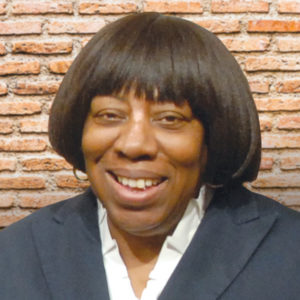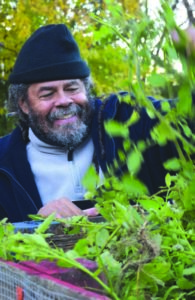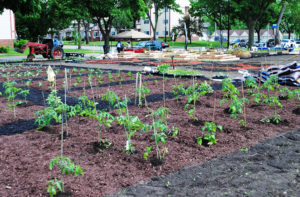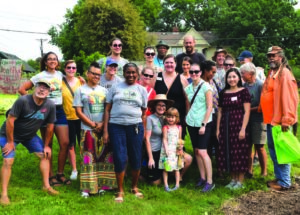Project Sweetie Pie: A North Minneapolis Model for Ensuring Food Security

I’m involved with a number of organizations that operate at the intersection of climate change, racial justice, and food security. One of these organizations is called Project Sweetie Pie, founded in 2010 by North Minneapolis food activist Michael Chaney. What prompted this initiative was the potential closing of North High School in Minneapolis. The community got together, they lobbied and protested, and ultimately they succeeded in keeping the high school open. During the process, Chaney noticed a greenhouse at the high school that had been fallow for a number of years. He contacted Rose McGee, who had a business selling sweet potato pies, and he asked: If I’m able to get high school students to start growing sweet potatoes in this greenhouse, would you buy them? That was the beginning of what we call Project Sweetie Pie.
Project Sweetie Pie is a nonprofit whose primary focus is food security in North Minneapolis, Minnesota, an area that has been designated as a food desert. What does this mean from the federal government’s perspective? It means that access to healthy foods for local residents is a burden. It’s the burden of not having access to grocery stores and local markets or the burden of having to take a bus downtown, come back up to the grocery store, buy your groceries, then take the bus back downtown just to take another bus to get home. This increases your burden because you have transportation costs and you’re limited by how much food you can carry.
Working in the dirt and gardening has a cathartic effect on people. There is a mental and emotional aspect to being able to connect with the earth and connect with growing.
Beyond the North High garden, Project Sweetie Pie has been working with the City of Minneapolis to grow community gardens. We lease ten lots from the city that have been designated as available for growing foods. We have another twenty lots provided by private owners and also from landowners who want to grow food but need our assistance. So, we provide them with assistance on how to grow food and the means to do that. Of course, we are subject to being booted out of the city lots if a developer wants that land (even if we’ve had it for a year or multiple years), but this is just one of the challenges we navigate.

Michael Chaney (Photo courtesy Karl Hakanson)
A lot of folks in North Minneapolis face all kinds of challenges. There are people who don’t know where their next meal is coming from or what that next meal will look like. We have a saturation of fast food restaurants, and it’s less expensive for me to get a Happy Meal than it would be for me to buy an orange at the local store. There are over 400 toxin sites identified by the Minnesota Pollution Control Agency in my ZIP code. There are another 300 in the adjoining ZIP code in North Minneapolis, which means we are an environmentally overburdened community. Our mission, therefore, as an organization and as a community, is to encourage people and provide them access to healthy foods in order to address some of the health disparities and other issues our community faces.
Making sure that the residents of North Minneapolis have access to healthy foods has morphed into a number of focus areas—improving their lives from a health perspective, from a transit perspective, working with government agencies, working with our political leaders, and working with the medical community, as well as crime prevention. You may be thinking, how does having a community garden impact crime prevention? Well, we’ve been written up and noted in newspapers for the fact that having young people working in the dirt, so to speak, has reduced crime. Working in the dirt and gardening has a cathartic effect on people. There is a mental and emotional aspect to being able to connect with the earth and connect with growing. We’ve seen that in so many areas and we’re very proud of that impact.
Today, Project Sweetie Pie works with kids in day care centers growing food (we have pictures on our website of kids who are just absolutely ecstatic because they found a worm in the dirt). We love our kids. We love the young folks. We love our adults. We love our teams. We love all of the community working together in the garden, supporting each other and growing their own food.

Photos courtesy Karl Hakanson
And we do have government agencies that are working to support us. The city of Minneapolis has established a Green Zone Initiative (I’m one of its task force members from North and Northeast Minneapolis), and we have the Park Board, which has an agricultural policy in place. For one, they’re allowing fruit trees to be grown. They had to actually change the law so that people would be able to pick the fruit from those trees because it had been illegal to do so.
We’re also seeing change happening at the legislative level. House File 2738 establishes a community portal that will address food issues and establish a food system throughout the state, ensuring residents have access to healthy foods no matter where they are.
One thing Project Sweetie Pie is looking to achieve is significant farming season extension. One way to do that would be to build what we’re calling a deep winter greenhouse. The University of Minnesota has an aggressive and extensive plan for a greenhouse. That’s something we’re looking for so that our residents will have year-round access to healthy food.
Recycling and composting is another area local residents are interested in. We call the composting we do at the Project Sweetie Pie community gardens our first harvest. It’s not waste. Project Sweetie Pie’s philosophy is that there is no waste—it’s all reusable and recyclable.
One of the challenges we face as an organization is how to get more and more minorities involved. People of color, people who have their day-to-day challenges, may not have the luxury of being involved. To their credit, they are interested. They’re concerned even though they may not show up at meetings. We seek to be part of their representation. We seek to make sure their voices are heard. We seek to make sure that their needs are put at the forefront of all the activities related not only to climate change, environmental overburden, and toxins but agriculture and other issues around economic development, health, and food security.

Photos courtesy Karl Hakanson
I’ve been working now on the Upper Harbor Terminal Project, which pertains to forty-eight acres of public land on the Mississippi River in North Minneapolis. The city has a plan that they’ve been working on with chosen developers, but we’re asking through a number of community-led organizations that this land remain under the ownership of the community. We don’t know what that legal structure would look like—it could be an agricultural cooperative, where farmers pool their resources to produce certain types of crops. It could be a land trust. But we want to make sure that the community has ownership and maintains ownership of that land.
Interestingly, of the 100 agricultural cooperatives in the US, Minnesota has the number one—CHS in Inver Grove Heights—and a total of three in the top ten. CHS is a mixed type, producing energy, supply food, and grain. Number three is St. Paul’s Land O’ Lakes, which is a dairy cooperative. There are also eight additional co-ops that are on the list. Minnesota is truly at the forefront of agricultural co-ops, partnerships (like Project Sweetie Pie and numerous others), and working together when we’re talking about agriculture. We want to continue that.
